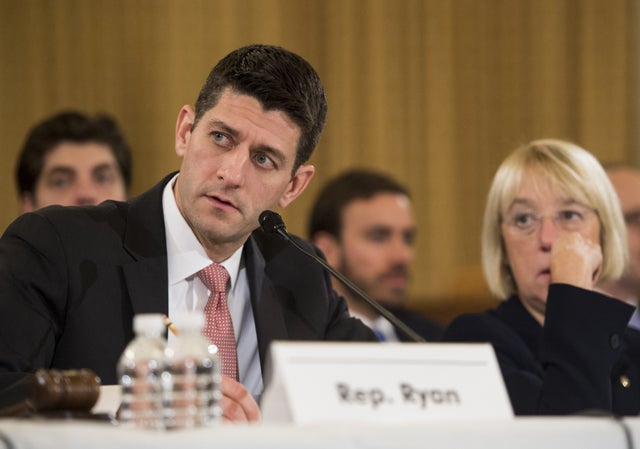The chairmen of the House and Senate budget conference committee reached a deal Tuesday night on a plan that would avert a government shutdown but leaves many conservatives disappointed with additional spending and revenue increases.
“The budget conferees failed to make substantive reforms to the real drivers of spending and debt: the entitlement programs,” said Romina Boccia, the Grover M. Hermann Fellow in Federal Budgetary Affairs at The Heritage Foundation. “Far from simply being another missed opportunity, this deal keeps the nation on its fiscal collision course.”
Even before the Bipartisan Budget Act of 2013 was announced at 6 p.m. ET, conservatives voiced concerns about replacing the sequester and busting through the spending caps that Congress and President Obama agreed to in 2011. Heritage Action for America said the plan would hike spending now for “woefully inadequate long-term reductions.”
Under the Ryan-Murray deal, discretionary spending would increase beyond the levels in the Budget Control Act of 2011. To pay for the additional spending, the deal would raise Transportation Security Administration fees and require new federal employees to contribute more toward their retirement programs. (Click here to read the four-page summary.)
The deal was hatched after weeks of negotiation between House Budget Chairman Paul Ryan (R-WI) and Senate Budget Chairwoman Patty Murray (D-WA). The two leaders hailed the compromise just days before the conference committee’s December 13 deadline.
“This agreement breaks through the recent dysfunction to prevent another government shutdown and roll back sequestration’s cuts to defense and domestic investments in a balanced way,” Murray said in a statement. “It’s a good step in the right direction that can hopefully rebuild some trust and serve as a foundation for continued bipartisan work.”
Ryan added: “I’m proud of this agreement,” Ryan said. “It reduces the deficit—without raising taxes. And it cuts spending in a smarter way.”
But Ryan’s rosy assessment was met with criticism from conservatives. The Conservative Action Project, a coalition of organizations from FreedomWorks and Americans for Prosperity to the Family Research Council and Tea Party Patriots, cautioned against undoing the bipartisan Budget Control Act of 2011.
A letter signed by 25 members of the Conservative Action Project warned:
The budget conference committee represents an opportunity for Congress and President Obama to honor their bipartisan agreement; it is not a vehicle to break budget limits or increase revenue. Rather than searching for ways to abandon a bipartisan spending agreement, Congress should pass legislation that upholds the caps and then focus their energy on something productive, like stopping the train wreck that is Obamacare.
On Capitol Hill, the deal was greeted with mixed reviews. House Republican leaders signaled their support, while both liberals and conservatives criticized it.
“While modest in scale,” Boehner said in a statement, “this agreement represents a positive step forward by replacing one-time spending cuts with permanent reforms to mandatory spending programs that will produce real, lasting savings.”
House Majority Leader Eric Cantor (R-VA) added: “This agreement is a step forward consistent with prior Republican attempts to replace the sequester’s indiscriminate across-the-board cuts.”
Meanwhile, appearing on CNN’s “Crossfire,” Representatives Adam Schiff (D-CA) and Tim Huelskamp (R-KS) expressed concern about the deal.
“I’m skeptical about what I’ve heard so far,” Schiff said. “Where it looks like we’re going for revenues doesn’t make a lot of sense. Tacking on fees to airline tickets is a strange way to finance a government. I’d much rather see us do away with some of the farm subsidies to the major agribusinesses that don’t need them as well as closing other special interest tax loopholes.”
“Far too often,” Huelskamp added, “the question in Washington seems to be ‘Can we make a deal?’ I’d rather say, ‘Can we find a solution.’ This deal raises spending. There’s no way around it. It’s more spending for both sides. Most conservatives would agree that’s the problem in Washington. I don’t know how a deal is good for conservatives or America if the spending is going to go up.”

























